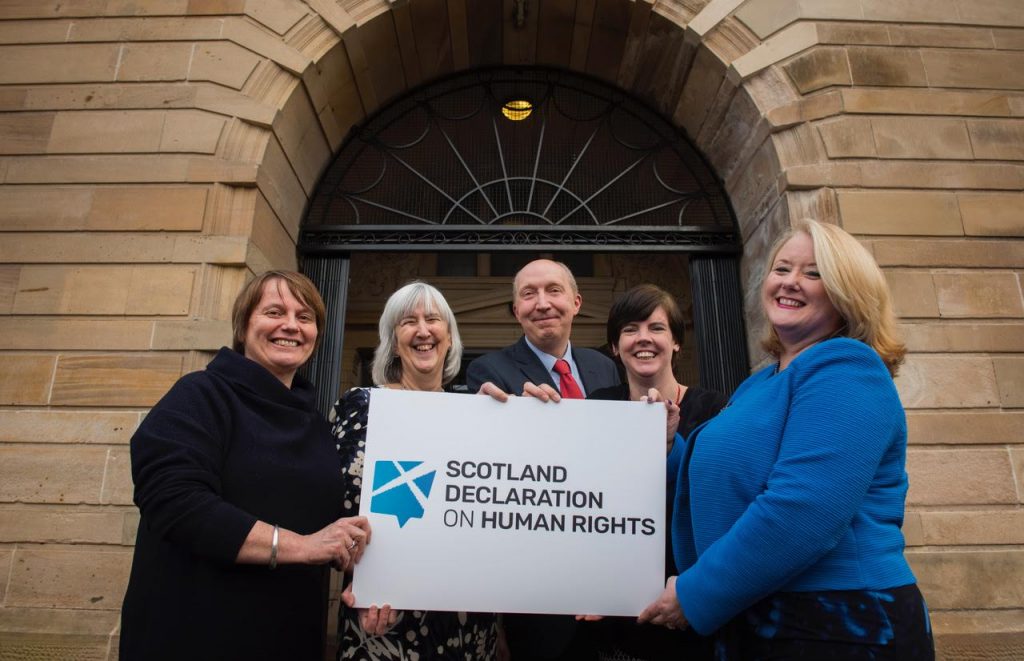The International Covenant on Economic, Social and Cultural Rights (ICESCR) is one of three documents that make up the International Bill of Rights, together with the Universal Declaration on Human Rights and the International Covenant on Civil and Political Rights.
What are ‘Economic, Social and Cultural Rights’?
Human rights are commonly divided into ‘civil and political rights’ and ‘economic, social and cultural rights’. Civil and political rights protect individuals’ freedom from interference by the state and make sure that everyone can take part in civil society. They include freedom of speech, freedom of assembly and the right not to be tortured.
Economic, social and cultural rights protect the basic necessities for life which includes the rights to food and water, to have a roof over your head, and to adequate healthcare. In this post, we’re looking at economic, social and cultural rights under the International Covenant on Economic, Social and Cultural Rights (ICESCR).
What does the ICESCR Do?

Image via Flickr
States parties to the ICESCR recognise that ‘freedom from fear and want can only be achieved if conditions are created whereby everyone may enjoy [their] economic, social and cultural rights‘.
The ICESCR protects the right to an adequate standard of living, including adequate food, clothing and housing (Article 11), the right to enjoy the ‘highest attainable standard’ of physical and mental health (Article 12), the right of everyone to education (Article 13), including free and compulsory primary education (Article 14), and the right to take part in cultural life (Article 15).
- to respect human rights – that is, not to violate the rights in the ICESCR;
- to protect the enjoyment of rights – against violations by third parties, such as other individuals or corporations; and
- to fulfil individuals’ rights – to take steps to create an environment in which rights can be fully achieved.
The ICESCR was adopted by the United Nations General Assembly in 1966. There are currently 169 states that are party to the ICESCR.
Who Keeps an Eye on the ICESCR?
The Committee on Economic, Social and Cultural Rights oversees commitment to the ICESCR by states parties. States parties have to submit reports on the steps they have taken to give effect to ICESCR rights and part of the Committee’s job is looking at these reports to make sure states are making progress.
In the Committee’s last observations on the UK in 2016, it was ‘seriously concerned’ about the impact of austerity measures on the enjoyment of ICESCR rights. For example, the Committee was worried about the UK government’s reforms to legal aid, which the Committee considered restricted access to justice.
Are Socio-Economic Rights Enforceable?

To a certain extent, yes. The ICESCR is an international treaty and binds the UK in international law, but that doesn’t automatically mean that individuals can complain to the Committee on Economic, Social and Cultural Rights alleging that ICESCR rights have been breached.
The Optional Protocol to ICESCR does allow individuals complain to the Committee about violations of their ICESCR rights, but, the UK hasn’t agreed to be bound by the Optional Protocol.
Many of the ICESCR rights are enforceable under UK law, although it isn’t directly part of UK law.
The Equality Act 2010, which considers socio-economic rights in its very first section, requires equal treatment. The Employment Rights Act 1996 governs good working conditions. And state benefits are available for different groups, including families, carers and job-seekers under other laws. These laws are all enforceable in UK courts.
Also, the Committee can consider complaints against one state by another. But both states involved must have declared that they recognised the Committee’s competence to receive inter-state complaints.
While the Committee’s concluding observations, aren’t legally binding, they are the opinion of an expert body. It would show bad faith in implementing ICESCR obligations to ignore that opinion. Even still, the Committee’s observations have caused changes in policy, practice and law.
The Optional Protocol to ICESCR also lets individuals complain to the committee of violations of their economic, social and cultural rights. But, the UK hasn’t agreed to be bound by the Optional Protocol.
What’s the Difference Between Economic, Social and Cultural Rights, and Civil and Political Rights?
 In February 2018, Scotland launched a new Declaration on Human Rights calling to protect rights Credit: Human rights Declaration Scotland
In February 2018, Scotland launched a new Declaration on Human Rights calling to protect rights Credit: Human rights Declaration Scotland
When the Universal Declaration of Human Rights was adopted, the United Nations General Assembly also wanted a covenant on human rights and systems to put it into effect. But, long debates at the start of the Cold War made writing the one instrument difficult, so the planned covenant was split into two. Although the two documents had to contain as many similar parts as possible.
Civil and political rights get more attention than economic, social and cultural rights. ICESCR rights are sometimes thought to be “second-class rights” because they’re unenforceable, can’t be reviewed in court and can only be fulfilled “progressively” over time, taking account of available resources.
It’s also thought that ICESCR rights require high levels of financial and human investment, while civil and political rights just need states not to interfere. But civil and political rights need a functioning court system for their enforcement, which means investment. Likewise, economic, social and cultural rights, like trade union freedoms, just need the state not to meddle.

There’s also considered to be an East-West divide, with Eastern countries more inclined to economic, social and cultural rights, and the Western countries more inclined to civil and political rights. An example of this is the fact that China is a party to ICESCR, but not the ICCPR, while the United States is a party to the ICCPR, but not ICESCR.
But, like the United Nations General Assembly said both types of rights are “interconnected and interdependent”. For example, the ICCPR right not to be subjected to torture or cruel, inhuman or degrading treatment or punishment is much the same as the ICESCR right not to be hungry.







